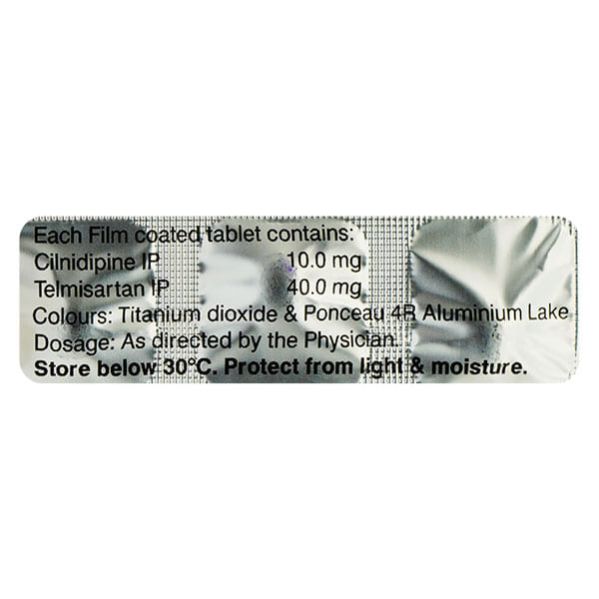DILNIP T 40 Tablet 15's
Cilnidipine 10 mg + Telmisartan 40 mg
₹ 258.00
₹287
(Inclusive of all taxes)
-

No Warranty
-

COD Avilable
-

Non Returnable
-

cancelable
About this item
INTRODUCTION ABOUT DILNIP T 40 TABLET
DILNIP T 40 TABLET is used in adults to manage essential hypertension (high blood pressure. It works by relaxing blood vessels, making it easier for the heart to pump blood. By lowering blood pressure, it reduces the risk of serious complications such as heart attacks and strokes.
DILNIP T 40 TABLET can be taken with or without food, but it is best to take it at the same time each day as directed by your doctor. The dosage will depend on your medical condition and response to the treatment. It is important to continue taking DILNIP T 40 TABLET even if you feel fine, as it helps lower the risk of long-term complications. For better results, complement the therapy with lifestyle changes such as regular exercise, quitting smoking, and following a low-salt, low-fat diet.
Before starting this medicine, inform your doctor if you have any kidney or liver issues or are severely dehydrated. Pregnant or breastfeeding women should also seek medical advice before use. Regular monitoring of blood pressure and kidney function may be necessary during treatment to ensure the medication is working effectively.
DILNIP T 40 TABLET is not recommended for use in patients with severe liver impairment, advanced aortic stenosis (narrowing of the valve in the large blood vessel branching off the heart (aorta) and primary aldosteronism.
The most common side effects of taking DILNIP T 40 TABLET are swelling in the ankles or feet (edema), headache, dizziness, sleepiness, fatigue, changes in taste, and stomach upset. Since it may cause dizziness, avoid driving or performing tasks that require focus until you know how it affects you. If side effects persist or cause discomfort, consult your doctor.
USES OF DILNIP T 40 TABLET
- It is used to manage essential high blood pressure (hypertension)
HOW DILNIP T 40 TABLET WORKS
DILNIP T 40 TABLET contains a combination of two medicines namely, Cilnidipine and Telmisartan respectively.
- Cilnidipine is a calcium channel blocker that works by blocking calcium entry into the smooth muscle cells of blood vessels. This action relaxes and widens the blood vessels, reducing resistance to blood flow and thereby lowering blood pressure. Additionally, cilnidipine also acts on the nerves controlling blood vessels, reducing stress-related constriction, which further helps to maintain steady blood pressure levels.
- Telmisartan is an angiotensin II receptor blocker (ARB). It inhibits the action of angiotensin II, a hormone that causes blood vessels to constrict and increases blood pressure. By blocking this effect, telmisartan relaxes blood vessels and improves blood flow, effectively lowering blood pressure.
Together, cilnidipine and telmisartan provide a dual mechanism to relax and widen blood vessels, enhancing blood circulation and reducing the risk of heart-related complications like heart attack and stroke.
DIRECTIONS FOR USE
- Take DILNIP T 40 TABLET as advised by your physician.
- Swallow DILNIP T 40 TABLET with a glass of water. Do not crush or chew the medicine.
- This medication can be taken with or without food, but it is important to take it at the same time every day to maintain consistent blood levels.
- Follow your doctor’s instructions regarding the dose and duration of use based on your health condition.
- Do not skip doses or stop taking the medication without consulting your doctor, even if you feel well, as this can lead to a sudden rise in blood pressure.
- Regularly monitor your blood pressure to ensure the medication is working effectively.
- If you miss a dose, take it as soon as you remember unless it is close to the time for your next dose; in such cases, skip the missed dose and continue with your regular schedule.
SIDE EFFECTS OF DILNIP T 40 TABLET
Like all medicines, DILNIP T 40 TABLET may cause certain side effects in some individuals, although not everybody gets them
Most Common Side Effects of DILNIP T 40 TABLET are:
- Dizziness, headache
- Peripheral edema (swelling of ankles, hands and legs)
- Flushing
- Upper respiratory tract infection including pharyngitis and sinusitis
- Hyperkalaemia (increased potassium levels in the blood)
- Slow heart rate
- Low blood pressure
- Stomach upset
- Back or muscle pain, muscle spasms
- Changes in taste
Stop taking DILNIP T 40 TABLET and contact your doctor immediately if you experience any of the following side effects:
- Anaphylactic reaction
- Angioedema (swelling underneath the skin)
- Acute renal failure
WARNING & PRECAUTIONS
PREGNANCY
ContraindicatedDILNIP T 40 TABLET is not recommended for use in pregnant women. Consult your doctor for advice.
BREASTFEEDING
ContraindicatedDILNIP T 40 TABLET is not recommended for use in breast-feeding women. Consult your doctor for advice.
DRIVING AND USING MACHINES
Use with CautionDo not drive or handle any machines if you experience dizziness after taking DILNIP T 40 TABLET.
ALCOHOL
Consult your doctorAvoid consumption of alcohol while taking DILNIP T 40 TABLET as it may cause low blood pressure while standing up from sitting or lying position (orthostatic hypotension).
KIDNEY
Use with CautionDILNIP T 40 TABLET should be used with caution in patients with chronic renal insufficiency. It should be used with caution in patients with impaired kidney function, bilateral renal artery stenosis or stenosis of the artery to a single functioning kidney. Consult your doctor before taking it.
LIVER
Consult your doctorDILNIP T 40 TABLET is not recommended for use in patients with severe liver impairment, cholestasis, biliary obstructive disorders. It should be used with caution in patients with mild to moderate liver impairment and elevated liver enzymes. Consult your doctor before taking it.
ALLERGY
ContraindicatedDo not take DILNIP T 40 TABLET if you are allergic to Telmisartan, Cilnidipine or calcium channel antagonists such as amlodipine, nifedipine.
HEART DISEASE
Consult your doctorDILNIP T 40 TABLET is not recommended for use in patients with advanced aortic stenosis. It should be used with caution in patients with aortic or mitral stenosis, obstructive hypertrophic cardiomyopathy, angina, ischaemic cardiopathy or ischaemic cardiovascular disease and congestive heart failure. Consult your doctor before taking it.
USE IN PEDIATRICS
ContraindicatedDILNIP T 40 TABLET is not recommended for use in children and adolescents (aged below 18 years). Consult your child’s doctor for advice.
USE IN GERIATRICS
Use with CautionDILNIP T 40 TABLET should be used with caution in elderly patients (aged 65 years and above). Consult your doctor before taking DILNIP T 40 TABLET.
OTHERS
DILNIP T 40 TABLET is not recommended for use if you:
- Primary aldosteronism
Before taking DILNIP T 40 TABLET, inform your doctor if you:
- Volume and/or sodium depletion by diuretic therapy, dietary salt restriction, diarrhoea or vomiting
- Diabetes
- Peripheral edema
- Metabolic acidosis, cellular lysis (such as acute limb ischemia, rhabdomyolysis, extended trauma)
INTERACTIONS
A. Drug-Drug interactions:
Before taking DILNIP T 40 TABLET inform your doctor, if you are taking or receiving any of these medicines:
- Angiotensin-converting enzyme (ACE) inhibitors (Ex. enalapril, lisinopril) angiotensin-II receptor antagonists drugs (Ex. losartan, irbesartan), diuretics (Ex. chlorthalidone, torsemide) and aliskiren (used to manage high blood pressure)
- Anti-psychotic drugs such as risperidone, quetiapine (used to manage mental health conditions such as schizophrenia)
- Digoxin, quinidine (used to manage heart problems)
- Lithium, antidepressants such as paroxetine, fluoxetine (used to manage depression)
- Non-steroidal anti-inflammatory drugs such as aspirin or ibuprofen including selective COX-2 inhibitors such as celecoxib (used to manage pain)
- Cyclosporin, tacrolimus (used to manage organ rejection after transplant)
- Potassium supplements, salt substitutes and potassium-sparing medicines (Ex. spironolactone) (used to manage fluid retention without potassium loss in the urine)
- Aldesleukin (used to manage kidney cancer)
- Trimethoprim, rifampicin, erythromycin (used to manage bacterial infection)
- Baclofen (used to manage relax muscles)
- Amifostine (used to protect the kidney from harmful effects of chemotherapy)
- Heparin (used to manage or manage blood clots)
- Phenytoin, barbiturates such as phenobarbital, pentobarbital (used to manage seizures)
- Narcotics such as morphine (used to manage severe pain)
Overdosage:
If you or anyone else accidentally take too much of DILNIP T 40 TABLET, consult your doctor immediately or visit the nearby hospital. Overdosage symptoms of DILNIP T 40 TABLET are low blood pressure, fast or slow heart rate, dizziness, increase in serum creatinine, acute renal failure, excessive peripheral vasodilatation.
SYNOPSIS
| Drug | : | Cilnidipine, Telmisartan |
| Pharmacological Category | : | Calcium channel blockers, Angiotensin II receptor antagonists |
| Therapeutic Indication | : | Hypertension |
| Dosage Forms | : | Tablet |
0 Review Of Product DILNIP T 40 Tablet 15's














